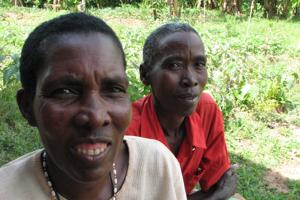
Caritas Rwanda marks half a century of overcoming conflict and poverty
“It wasn’t easy to get people to talk after the genocide, but it was so necessary. There is no way to move on without reconciliation,” said Fr. Oreste Incimatata, Secretary General of Caritas Rwanda, recalling this tragic period.
Caritas Rwanda has been celebrating its 50th anniversary in 2010. At the end of 12 months of special events, an important celebration will be held in a stadium in the capital Kigali with thousands of local Caritas staff, representatives from Caritas members from Africa and other parts of the world as well as Lesley-Anne Knight, Secretary General of Caritas Internationalis.
Many challenges remain in the country, but much has been achieved according to the Caritas Rwanda leader.
“We have come a long way, there still exists a certain suspicion among people from different ethnic groups and poverty is widespread, but we are on the right track. I am very optimistic,” said Fr. Incimatata.
Caritas in Rwanda has always fought for conflict resolution and reconciliation, whether before, during or after the war and genocide of 1990 and 1994. In fact, interethnic conflict is at the very origin of its founding: activities started with help for displaced people after the social unrests of 1959.
In the following years, marred by recurrent famines, Caritas aid programmes were set up in other parts of the country. Inspired by Pope Paul VI encyclical “Populorum Progressio”, the work started to focus on development actions in the 1970s, promoting employment and training, especially for women, craftsmen and farmers.
“We always made great efforts to avoid any type of ethnic reference and tried to favour a national sense of belonging together. This message accompanied our actions in the fields of nutrition, housing, health care and education,” said Fr. Michel Descombes, Secretary General of Caritas Rwanda from 1978 to 1995.
“Our staff reflects this openness and diversity,” added Fr. Incimatata. “We have always had Hutus and Tutsis working together. This is what gives us credibility and what made it easier for us to get people to work together after the genocide.”
After war broke out in October 1990 on the Ugandan border, Caritas provided food, clothes and care to people in camps and looked after orphans. Caritas stayed in the country to help people as long as possible until the genocide when they had to flee into exile into Burundi. The organisation’s staff suffered very much from the tragic events of 1994. Five Caritas employees lost their lives. Others fled out of the country and never came back.
“It was in these hardest moments that we really felt the solidarity of the Caritas confederation,” said Fr. Incimatata. “International Caritas organisations were already there when we came back and helped us rebuild”.
Caritas members helped rebuild the infrastructure, restart agriculture and encourage reconciliation. Women victims of rape and other violence received psycho-social support.
“A special attention was needed for the countless orphans the genocide left behind. We found foster parents for several hundreds of them and provided psycho-social support and school materials. We are happy to say that the majority of these children finished school and managed to go on with their lives despite their traumatic experiences,” said Thérèse Nduwamungu, the former Head of Social and Charity Actions at Caritas Rwanda.
Caritas Rwanda now runs healthcare, education, food security and livelihoods programmes all throughout the country. The organisation counts 30 staff at the national office and around 60,000 volunteers.
